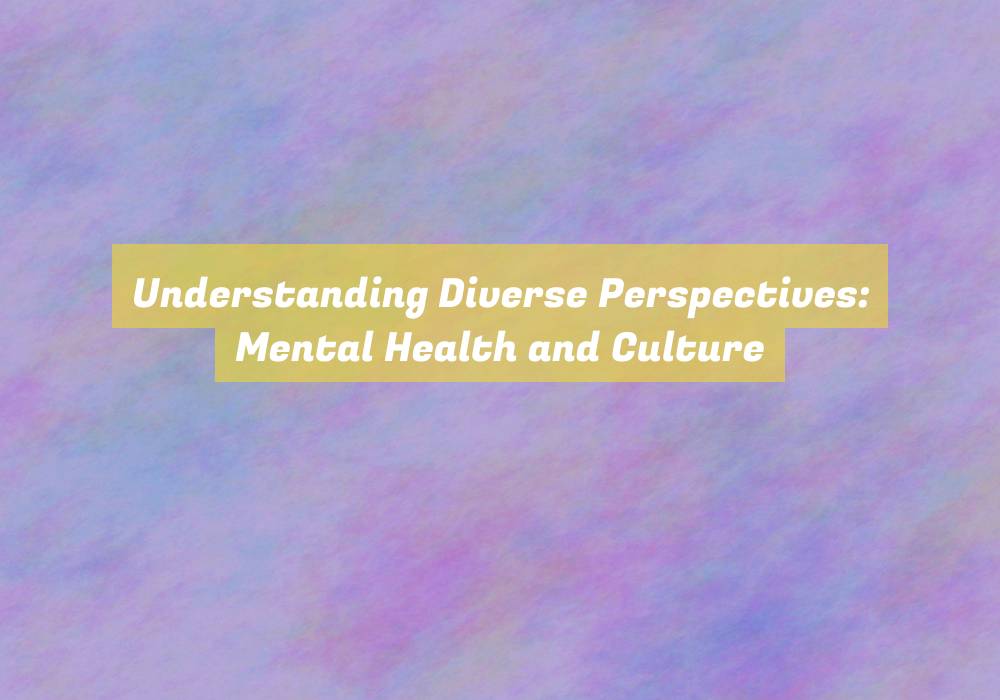Understanding Diverse Perspectives: Mental Health and Culture
YouG??ve probably heard the old saying, G??When you look at someone through rose-colored glasses, all the red flags just look like flags.G?? This metaphor perfectly captures the complexity of understanding diverse perspectives on mental health within different cultural contexts.
ThereG??s a wealth of knowledge to be gained from exploring how cultural beliefs, practices, and values shape the way mental health is perceived and addressed.
ItG??s a fascinating journey that will challenge your preconceived notions and broaden your understanding of the human experience.
Cultural Influences on Mental Health
Understanding how cultural beliefs and practices impact mental health is essential for providing effective and culturally sensitive care. Your cultural background significantly shapes your perceptions of mental health and influences the way you seek and receive care. For example, in some cultures, mental health issues may be stigmatized, leading individuals to feel ashamed or reluctant to seek help. On the other hand, certain cultures may prioritize community support and holistic healing practices, impacting the type of treatment individuals find acceptable. ItG??s crucial to recognize these cultural variations when providing mental health care to ensure that interventions are respectful and effective.
Moreover, cultural beliefs about the causes of mental health issues can also shape treatment approaches. Your understanding of mental illness may be influenced by cultural factors such as spirituality, family dynamics, and traditional healing practices. These beliefs can impact your willingness to engage in Western mental health treatments, making it important for mental health professionals to acknowledge and integrate cultural perspectives into their care practices. By recognizing and respecting these cultural influences, mental health professionals can create more inclusive and effective treatment plans that align with diverse cultural beliefs and practices.
Stigma and Beliefs Across Cultures
Cultural influences on mental health shape the stigma and beliefs surrounding mental illness across diverse cultural backgrounds. In your cultural context, attitudes towards mental health issues may be influenced by traditional beliefs, religious perspectives, and societal norms. These cultural factors can either perpetuate stigma or promote understanding and acceptance of mental illness.
In some cultures, mental illness is stigmatized and viewed as a personal failure or a sign of weakness. This stigma can lead to individuals feeling ashamed and reluctant to seek help. On the other hand, certain cultural beliefs may attribute mental health struggles to spiritual or supernatural causes, leading to unique approaches to treatment and support. Understanding these diverse cultural perspectives is crucial for providing effective and culturally sensitive mental health care.
Challenging stigma and changing beliefs surrounding mental health across cultures requires a multifaceted approach that respects and integrates cultural values and practices. By recognizing and addressing the specific stigmas and beliefs within different cultural contexts, it becomes possible to promote mental health awareness and support systems that are inclusive and respectful of diverse perspectives.
Cultural Practices and Coping Mechanisms
Incorporating traditional cultural practices and coping mechanisms into mental health care can foster a deeper understanding of individual needs and experiences. Cultural practices such as meditation, storytelling, and traditional healing rituals can play a significant role in promoting mental well-being.
For example, in many Asian cultures, meditation and mindfulness practices are deeply ingrained in daily life and are often used as coping mechanisms for managing stress and anxiety. Similarly, in some African and Native American communities, storytelling and communal rituals are used as therapeutic tools for addressing mental health challenges.
By integrating these cultural practices into mental health care, individuals can feel more connected to their heritage and community, which can have a positive impact on their overall well-being. Furthermore, understanding and respecting these cultural coping mechanisms can help mental health professionals tailor treatment plans that are more aligned with an individualG??s cultural background and belief systems.
This approach not only enhances the effectiveness of mental health care but also promotes a sense of inclusivity and cultural competence within the healthcare system.
Culturally Sensitive Mental Health Support
To provide culturally sensitive mental health support, itG??s essential to actively engage with and respect the diverse cultural backgrounds and beliefs of individuals seeking care. Understanding and acknowledging the influence of culture on mental health experiences is crucial in delivering effective support.
This involves recognizing that different cultures may have unique perspectives on mental health, illness, and wellness. ItG??s important to approach each individual with an open mind, seeking to learn about their cultural practices and beliefs related to mental health. By actively listening and valuing the perspectives of those from diverse cultural backgrounds, you can tailor your support to align with their cultural values and preferences.
Additionally, collaborating with community leaders and cultural experts can enhance your understanding and approach to providing culturally sensitive care. By integrating cultural competence into mental health support, you can create a safe and inclusive environment where individuals feel understood and respected.
Ultimately, by embracing cultural sensitivity, you can help bridge the gap in mental health disparities and improve access to care for all individuals, regardless of their cultural background.
Conclusion
In conclusion, understanding diverse perspectives on mental health and culture is crucial for providing effective support to individuals from different backgrounds.
By recognizing cultural influences, addressing stigma, and incorporating culturally sensitive practices, mental health professionals can better meet the unique needs of their clients.
ItG??s important to continue learning and adapting in order to provide the best possible care for all individuals, regardless of their cultural background.





This brings to mind the different ways mental health issues are seen across cultures. I grew up in a community where discussing mental health was pretty taboo, and it took me a long time to realize that seeking help was okay. I think it’s interesting how those cultural norms can create barriers for so many people. I wonder how technology, like teletherapy, is changing this dynamic—making it easier for people to access care even when local stigma might hold them back. It feels like there’s a real push towards breaking down those barriers, which is encouraging. Have you seen any particular cultural practices that are positively influencing how people approach mental health?